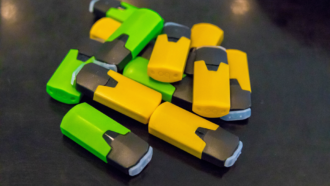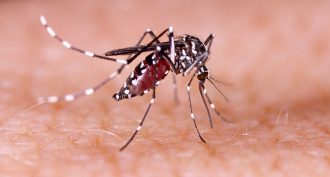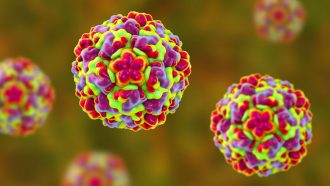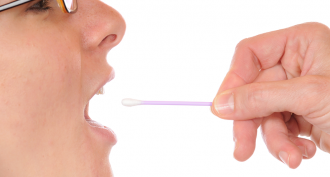Health & Medicine
-
 Health & Medicine
Health & MedicineToday’s nico-teen addicts: What role does ‘juuling’ play?
New data show that the most popular type of U.S. vapes deliver nicotine especially efficiently — boosting risk of addiction.
By Janet Raloff -
 Health & Medicine
Health & MedicineVaping emerges as possible trigger for seizures
Anonymous accounts have been filed with the FDA reporting seizures in teens after vaping. These were linked most often to JUUL and related pods.
By Janet Raloff -
 Brain
BrainAs teens gain weight, they find high-fat foods less pleasurable
Teens who gained excess weight showed less activity in the brain’s reward center when viewing or tasting foods with lots of fat.
-
 Brain
BrainSleep may jumpstart the brain’s power washing system
Waves of fluid wash into the human brain during sleep. That’s good. They just may help clean out toxic proteins.
-
 Health & Medicine
Health & MedicineHealth risks are scaring some teen vapers into considering quitting
As teens learn of serious — and sometimes lethal — risks associated with vaping, many are looking to quit their e-cig use. The challenge is finding groups able to help them.
-
 Planets
PlanetsDoes the moon influence people?
Unless you believe in werewolves (and you shouldn’t), there are few compelling data to suggest the moon has a big effect on people.
By Erin Wayman -
 Health & Medicine
Health & MedicineThe science of ghosts
One in five Americans say they’ve encountered a ghost. But science has no evidence that ghosts are real. Here are more likely explanations.
-
 Tech
TechGraphene fabric keeps mosquitoes from biting
Graphene is a super-thin material with many cool uses. The latest: protection against mosquito bites by embedding it in your clothing.
-
 Health & Medicine
Health & MedicineCould disabling one protein cure the common cold?
Cold viruses — and there are many — seem to need this human molecule to spread.
By Sofie Bates -
 Genetics
GeneticsExplainer: How DNA testing works
Lots of companies will now test DNA from people and their pets. How do these gene-sequencing techniques work? We explain.
-
 Brain
BrainSlower brain development ups a teen’s risk of getting into a car accident
Lack of driving experience isn't the only factor in whether a teen gets into a car crash. Crash risk in young drivers is also related to development of their brains’ working memory.
-
 Earth
EarthAir pollution intensifies a teen’s feeling of stress
Living where the air is dirty may make tough situations even more stressful — especially for teens suffering from anxiety or depression.